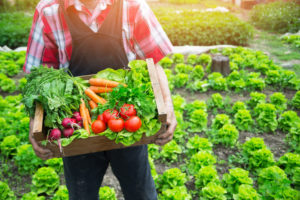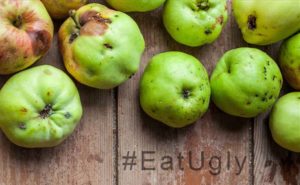Kroger Launches “Ugly Produce” Program to Combat Food Waste
Food waste is definitely getting it’s moment in the sun right now, as citizens, governments, and companies are realizing how important it is for our future to reduce food waste, and feed the hungry. Kroger, a top national grocery store chain has come out with a great proposal this week to help with the food waste issue, selling ugly produce! They stated that 6 billion pounds of produce goes to waste in their stores each year because it is misshapen, discolored, or has some other kind of blemish. To combat this issue, they are being a leader in their industry by proposing creating a line of “ugly produce”, called peculiar picks, which will be launched at the beginning of 2019. To coincide with this new program, they also have created a blog called “Wilted to Wonderful”, where they feature recipes on how to use this produce. Kroger is also working towards a zero-waste model in the future.
In a Delish article, they describe this new program:
“…to transform the narrative around imperfect produce” as part of the grocery chain’s Zero Hunger | Zero Waste Plan. Customers who buy the “ugly” produce will help Kroger’s efforts to limit food waste.
Zero Hunger | Zero Waste is an initiative The Kroger Co. announced in September 2017 “aimed at ending hunger in the communities Kroger calls home, and eliminating waste across the company by 2025,” a press release explained.”
Kroger isn’t the first grocery store to sell “ugly produce”, but it is a leader in the industry at trying to change consumer perception of what a healthy, nutritious and delicious piece of produce looks like, many times it is not perfect! We need to change our perceptions and that will fuel a better environment to reduce waste. Ugly produce may even be better for you, according to this NPR article.
To read more about what Kroger is doing surrounding food waste and other issues in the food world read here.
If you want to read more about Food Waste and the role of eating imperfect produce in the issue, Civil Eats has a great piece on it here.
What we Eat Matters Now More Than Ever Because of Climate Change 
Following the UN’s Intergovernmental Panel on Climate Change’s Report that came out last month on the dire state of our planet in regards to climate change, many people may be feeling helpless. You need not have these feelings though, because there are some easy things that you can do to make a difference and it all starts with food. Vice wrote a great article giving seven concrete and easy ways to change your eating, cooking and buying habits to make an impact with climate change.

- Eat Less Meat
- Eat Organic
- Eat Local & Organic
- Don’t Waste food and compost when you can!
- If you Eat Fish, Eat the Right Kind of Fish
- Cut Down On Packaged and Processed Foods
- Spend Less Money on Foods, And Spend your Money in the Right Places When it Comes to Food Choices
Though many of these things are statements you may have heard before, if you can start by doing one or two of these and eventually incorporating all of them into you lifestyle then it will make a big impact on our global footprint. Be the change you want to see, and people around you will follow. Everyone has to make the choices that work for them, but these are no-brainer choices. Eating less meat, and supporting organic and local, is better for your body and the planet. Composting and having less food waste helps you financially, and helps the planet as well. Eating better fish, and making better choices in what suppliers you spend your money with, will help support good practices and weed out bad ones. Cutting down on processed foods and packaged foods is better for you and for the planet, because it will send a message to companies as to what the consumer is looking for, and maybe they will change their offerings. These are all changes in the way you look at and interact with our food system, by doing these things you are helping your fellow people, yourself and the planet.
Read the whole article here.
NYC is Officially Banning All Styrofoam, starting January 1st! 
Styrofoam or Polystyrene food and beverage containers, are finally going to be banned from all New York City restaurants starting January 1st, 2019. These containers have been talked about for a few years now as being non-recyclable and big pollutants in NYC streets, waterways and recycling facilities.
According to the Natural Resources Defense Council:
“In May 2017, New York City Sanitation Commissioner Kathryn Garcia issued a determination in which she concluded, after extensive analysis, that dirty polystyrene foam coffee cups and clamshells could not be recycled “in an environmentally effective or an economically feasible manner.”
“For 30 years, attempts to recycle Food-Service Foam—both subsidized and non-subsidized attempts—have failed at each step of the recycling process,” she wrote at the time. And consistent with the 2013 law, sponsored by former Councilmember Lewis Fidler, the Commissioner directed that New York City food service establishments end the use of polystyrene food and beverage containers and instead use more environmentally friendly substitutes.”
After years of debate (since 2013), and many road blocks for this law to be passed, mid-October there was an unanimous decision of the Manhattan-based Appellate Division, First Department to finally ban the containers stating that they cannot be realistically recycled and are not a rational choice for ‘to go’ containers.
This is a positive step for the city, which follows in the steps of over 200 cities nationwide which have already banned styrofoam. Hopefully, this is a step towards using less products that harm our environment and finding more sustainable and compostable options.
To read the full article go here.


Comments are closed.